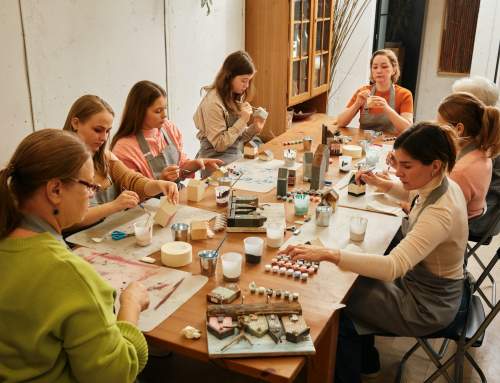Learn More and earn more? The facts prove it – when you build your knowledge, you build your worth. This is true for both formal education (as in qualifications) and informal education (professional development, on-the-job training and developing soft skills like emotional intelligence).
As a career coach, I often hear about people who aren’t interested in further learning. I’m told “it will take too much time” or “I already have a qualification” or worse “it’s a waste of time”. I can understand these objections but they are short-sighted – and in the current job climate – dangerous for your career.. The nature of work is changing rapidly and now more than ever it is critical to expand both your hard and soft skills to increase (or maintain) your salary and stay employable.
What Are You Worth?
In this context, when I talk about ‘worth’ I am not talking about your intrinsic worth as a human being, I’m talking about your perceived worth as an employee.
The really obvious way to measure your worth as a worker is your salary. But that’s a short-term measure. It can easily change depending on your job or circumstances. Another measure of your worth is how employable you are, that is – do you have the skills that employers want? A third, measure of your worth is whether you achieve career success usually measured by meeting key performance criteria.
Regardless of how you measure your workplace value, being a lifelong learner will build your worth across these measures.
What does lifelong learning bring to your career?
In his TED Talk, Essentials for Lifelong Learning, Designer Danny Stillion, says pursuing lifelong learning brings infinite possibilities. Rather than feel trapped in a job you hate, being a curious lifelong learner gives you the creativity, confidence and capability to go after the career opportunities you want.
“I’ve come to value three essential elements to lifelong learning: Curiosity + Passion + Empathy. When you take these three and sum them up they lead to infinite possibilities,” said Mr Stillion.
Approaching your career with curiosity gives you permission to dream, an appetite to ask questions and the passion to keep learning until you find the answer.
In a previous blog, I wrote about the importance of creativity to a sustaining a long and successful career. Curiosity is a key ingredient of creative thinking. Curious people ask questions like:
- Why is it done like this?
- Can we do it better?
- How can I make it better?
Curious and creative people are valued by employers because they solve an organisation’s problems. Recently I was talking to a person who was able to switch careers because she solved a company’s problem. She wasn’t in the market for a new job but she had recently finished a professional development course on problem solving, and now is the Chief Innovation Officer for her new employer.
Curious and passionate employees are change makers. And passion is infectious – it influences a workplace culture. When you combine passion and curiosity with emotional intelligence it is a driving force for a cultural shift. So, if you’re concerned about losing your job to automation, think about this – a robot can perform tasks but it cannot demonstrate ingenuity, curiosity, passion, nor can it influence others to change.
I touched on emotional intelligence above and it is the final ingredient. In his article How to Increase Your Emotional Intelligence ― 6 Essentials, Preston Ni defines emotional intelligence as “the ability to understand, manage, and effectively express one’s own feelings, as well as engage and navigate successfully with those of others.” I’ll go into more detail on the significance of emotional intelligence to your career later in this article.
An employee who is a lifelong learner, combining curiosity, passion and emotional intelligence is prized by employers.
Learn More, Earn More?
Australian Census Data 2016 shows that the further you go with your formal education, the more likely you are to be employed AND the more money you earn. In fact, the data shows people with a bachelor’s degree earn twice as much as those without. So, while pursuing higher education can seem time consuming and expensive in the short-term, it does pay dividends for your career, earnings and employability in the long-term.
It’s not just about degrees
Not everyone has the time, money or capacity to pursue a university education. That doesn’t mean you have to stop learning at high school. There are many other valid ways to grow your knowledge and your worth.
Learning from mistakes
Earlier this year, I wrote about how important it is to cultivate a growth mindset for a long and successful career.
People with a growth mindset accept that making mistakes is a critical way to learn and grow their capabilities.
The National Basketball Association says that by acclamation, Michael Jordan was the greatest basketballer of all time. He earned an estimated USD$94 million in his career. Yet, Michael Jordan says failure was the biggest driver of his success.
“I’ve missed more than 9000 shots in my career. I’ve lost almost 300 games. 26 times, I’ve been trusted to take the game winning shot and missed. I’ve failed over and over and over again in my life. And that is why I succeed.” Michael Jordan
For Michael Jordan, failure was an opportunity to try, learn and try again. So, through applying a growth mindset to his career (curiosity, passion and empathy), he earned both acclaim and a big pay cheque.
The importance of soft skills
According to the Edelman Trust Barometer, in 2018, the Australian public’s trust in media, business, government and NGOs is at an all-time low (and sits just four points above the world’s least trusting country, Russia!).
As the world becomes more automated, employers are looking for people with high emotional intelligence (EQ) who can listen, build rapport and create trusting relationships with customers and colleagues.
US-based EQ training company, Talent Smart, says 90 percent of top performers have high EQ and earn USD$29,000 more per year. They also say 80 percent of low performers have low emotional intelligence.
So, building your EQ by understanding your own emotions and showing empathy towards others is a great way to increase your salary and future proof your employability as computers start to do more process-driven work.
Source: http://www.talentsmart.com
On the Job Learning
Learning on the job is another way to build your knowledge and your worth. You can do this by teaming up with colleagues in your business who have the knowledge and skills you need (and vice-versa). For example, you could ask the accountant how to read a balance sheet and income statement. This is a critical business skill that will help you to:
- Understand the financial drivers of the business.
- Put forward a business case where the numbers add up.
- Manage your work to optimise the company’s cash flow.
Imagine going to your next salary review with a business case demonstrating how you have contributed to the company’s profitability and cash flow. It makes a compelling reason for a pay rise.
Online Learning
One of my clients recently said to me, “I am too old to go back to university. I would look ridiculous in the lecture with all those young kids”. This is a common concern. So, if attending university for lectures isn’t your thing, then you can gain formal qualification by signing up to online learning. There are many options from reputable educators, like Open University, where you can earn a degree from numerous universities.
If formal education isn’t for you, there are many online courses you can access for free or low cost. Providers like LinkedIn offer free online courses allowing you to learn and improve your skills when it suits you or when you need those particular skills.
For example, I know a marketing consultant who learned online how to produce podcasts. This allowed her to offer another service to her clients, and her time investment was rewarded with a new income stream.
Being a lifelong learner, both formally and informally, will help you earn more and stay employable. But with hundreds of pathways to learn, it can be hard to know which one to take. I can help you identify gaps in your hard and soft skills, give you direction and offer encouragement and support along the way. To learn more and earn more, book a career breakthrough session with me today.
To find out more about how to be a lifelong learner:









